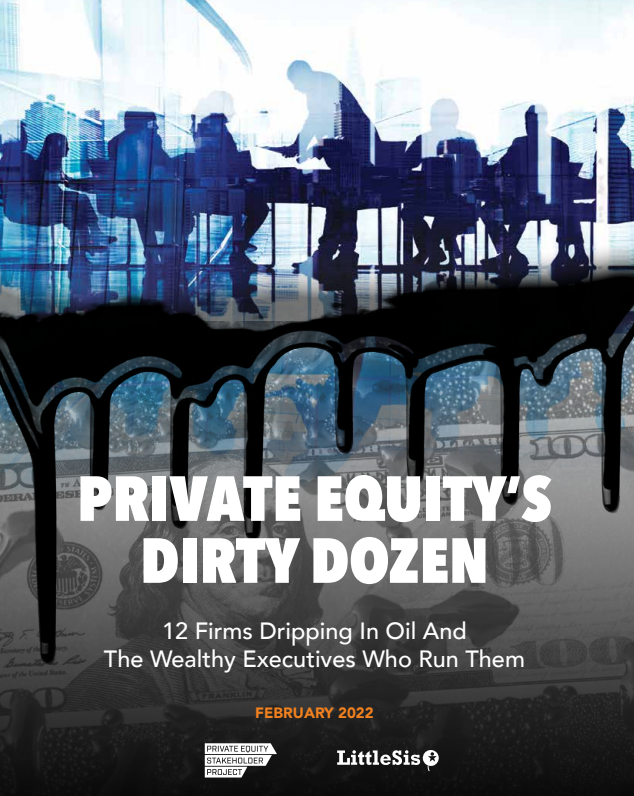Private equity firms have created a class of ultra-wealthy men who sit at the helm of large, secretive Wall Street enterprises that continue to invest in destructive fossil fuels despite the climate crisis.
The private equity industry manages over $7 trillion in capital, which is invested around the world in every sector of the economy. Despite the shroud of secrecy surrounding these investments, recent reports reveal that private equity has invested billions in fossil fuels.
“As the oil and gas industry faces upheaval amid global price gyrations and catastrophic climate change,” the New York Times reported, “private equity firms — a class of investors with a hyper focus on maximizing profits — have stepped into the fray.”
Indeed, while other Wall Street actors like asset managers and big banks have come under intense criticism for their roles in bankrolling climate catastrophe, private equity firms and the billionaires and multi-millionaires who lead them have largely escaped scrutiny.
Click here to read the full report ≫
This needs to change. Private equity firms are fueling the climate crisis and environmental injustice with investments in fracked gas, oil pipelines, coal plants, and offshore drilling. These damaging investments mirror private equity’s other destructive impacts in other areas of the economy like in retail,iv restaurants, health care, and incarceration.
The private equity executives featured in this report lead 12 firms that have substantial investments in fossil fuels.
Private equity has been called a “billionaire factory” for its creation of eye-popping wealth for the executives perched at the top of the firms. These tycoons are some of the most influential people in the world. They are chummy with powerful elected officials, to whom they donate piles of money. They hold prestigious trusteeships at elite universities and cultural institutions. Buildings are named after them. They own professional sports franchises. They are fêted and celebrated by polite society.
Between their yachts, mansions and private jets, these private equity executives live some of the lushest lives of anyone on the planet. But in many cases, they sustain their wealth and status by steering their firms’ investments into – among other dubious things – dirty energy.
This report profiles some of the most destructive fossil fuel investments of the world’s top private equity firms and the huge fortunes, luxurious lives, prized possessions, powerful connections and prestigious positions that these firms’ top executives have accumulated through those dirty investments.
Many of us are connected to private equity without even realizing it. Private equity’s vast supplies of capital to invest across the global economy come largely from institutional investors, including public and private pension funds. The Guardian recently wrote “How workers unknowingly fund the climate crisis with their pensions,” noting that “workers’ retirement savings go into funds that are buying up fossil fuel assets and squeezing them for profit in their final breaths.” Indeed, in 2020, state owned institutions, like public pension funds and sovereign wealth funds, invested 22 percent of the trillions in their portfolios in private equity.
- Carlyle Group, whose Co-Founder and Non-Executive Co-Chairman David M. Rubenstein has used his billions to fashion himself into a celebrated public figure even as his firm owns dirty oil and gas companies like Hilcorp Energy, whose methane emissions dwarf those of ExxonMobil and whose leaky underwater oil pipeline in Alaska threatens precious wildlife.
- Blackstone Group, who’s Trump-tied CEO Stephen Schwarzman is worth over $40 billion and owns one of the dirtiest coal plants in the U.S along with a significant ownership stake in the owner of the controversial Dakota Access Pipeline.
- KKR, whose planned Coastal Gaslink pipeline is facing cost overruns and blockades by the Indigenous Wet’suwet’en Clan of British Columbia, an investment made under the tutelage of billionaire founder Henry Kravis.
- Ares Management, whose head Tony Ressler is well-connected to the Los Angeles area arts world while owning a stake in California Resources Corporation (CRC), the state’s largest oil and gas producer that has burdened California communities with onerous environmental liabilities.
- ArcLight Capital, whose Trump-tied Managing Director and Founder Daniel Revers glazes his public image through big donations and university trusteeships even as he bankrolls toxic oil refineries and power plants stretching from the Caribbean to New York City.
- OakTree Capital, whose billionaire co-founders Bruce Karsh and Howard Marks together personally own hundreds of millions of dollars worth of luxury homes around the world while gobbling up oil and gas production wells across Appalachia and Oklahoma.
- Kayne Anderson founder Ric Kayne, a yacht collector who held an ownership stake in Plains All American Pipeline, which was responsible for the Refugio Beach oil spill on the California Coast in 2015, resulting in a $60 million penalty leveraged by the Department of Justice.
- Riverstone Holdings founder David M. Leuschen, whose company owns Talen Energy, a power generation company operating in eight states that owns over a dozen fossil fuel and coal plants, paid a $1 million settlement over charges of water contamination.
Solving our climate and environmental justice crises must include challenging the power and influence of private equity, one of the fossil fuel industry’s major sources of investment. This report maps out the names and networks of the billionaires and multi-millionaires who lead these firms.

